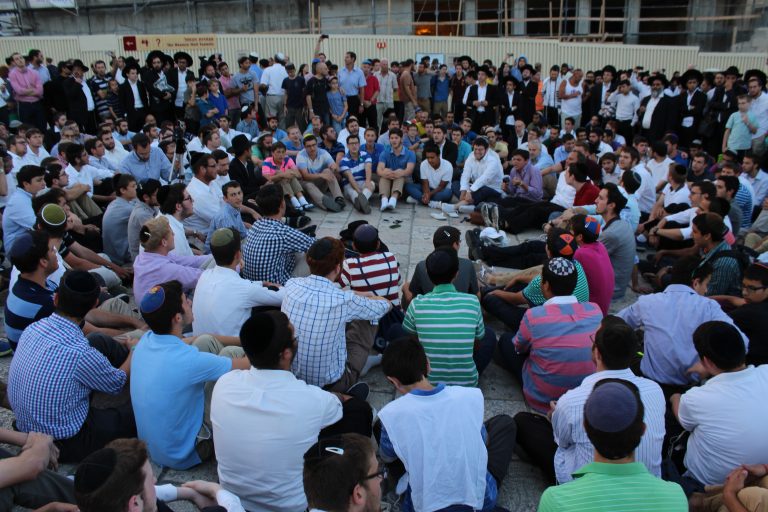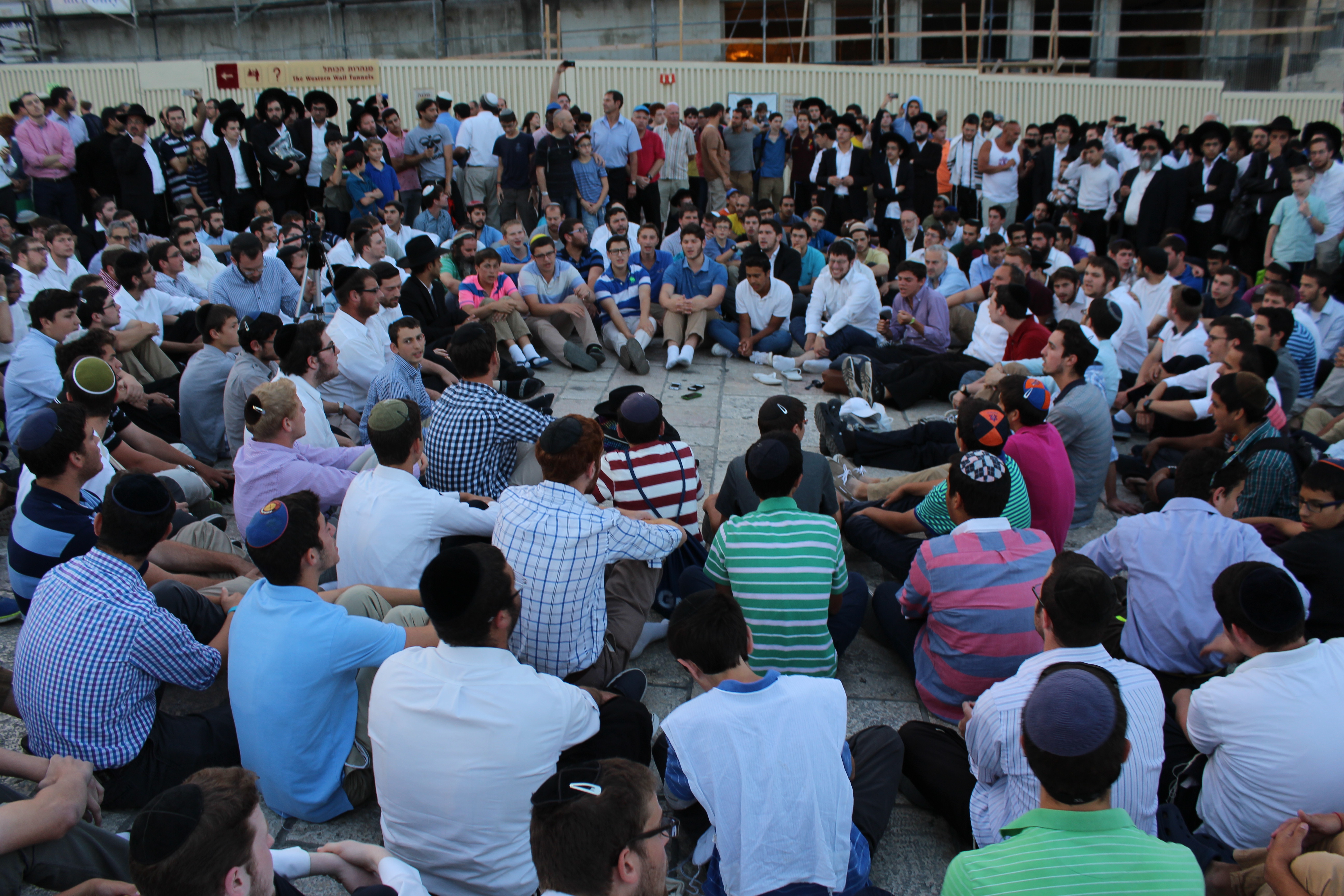Literally: “Come, Sit Down”
What is the “Kumzitz?”
 Actually, nothing; that is, it’s a made-up term in the context of the Seder, but the “Kumzitz,” which means an informal concert of songs, is a very good description for what happens after the Seder. Those still awake sing five (or six) songs (in Eretz Yisrael, where only one Seder is held, the number is five; in the Diaspora (outside of E.Y.), where two Sedarim are conducted, the number is six).
Actually, nothing; that is, it’s a made-up term in the context of the Seder, but the “Kumzitz,” which means an informal concert of songs, is a very good description for what happens after the Seder. Those still awake sing five (or six) songs (in Eretz Yisrael, where only one Seder is held, the number is five; in the Diaspora (outside of E.Y.), where two Sedarim are conducted, the number is six).
This, incidentally, may be the only case of there being an advantage for a Jew to be living outside of Eretz Yisrael. This is because there is so much work involved in preparing for Pesach and the Seder, that it is very difficult for those who put in the most effort to stay awake to enjoy the Seder. In the Diaspora, one has a Second Chance!
The five songs are:
1a. “Uv’Chen VaYehi BaChatzi HaLailah” –
“And thus, it Happened at Midnight”
sung at the first Seder, or
1b. “Uv’chen VaAmartem Zevach Pesach” –
“And thus, you shall say, ‘It is the Pesach Sacrifice’ “
sung at the Second Seder (Diaspora only)
The use of the word “Uv’chen,” “And thus,” in the titles of each of these songs is no accident. It marks the reaching of a high spiritual level, and it appears several times in the Shemoneh Esray Prayer of the High Holidays, Rosh HaShanah and Yom Kippur, when we have come closest to Hashem through Repentance and Fasting. It is also used by Queen Esther, when she prepares to go on her crucial life-or-death mission before King Achashverosh, on behalf of her People after fasting for three days.
We too have, at this point in the Seder, reached a high level of identification with our People, with its Past as well as with its Present and Future.
2. “Ki Lo Naeh, Ki Lo Yaeh (Keter Meluchah)” –
“For Him is Pleasant; for Him is Appropriate (The Crown of Kingship)”
3. “Adir Hu” –
“Mighty is He”
4. “Echad mi Yodea?” –
“Who Knows One?”
5. “Chad Gadya” –
“One Little Goat”
1a. “…Vayehi BaChatzi HaLailah”
“And it happened at midnight …”
… is a survey of Jewish History, whose theme is that many of G-d’s Miracles in our behalf have been performed at midnight. One stanza says,
“Egypt’s first-born You did crush at midnight;
Their strength they had lost when they rose at night;
Sisera, Prince of Charoshet, You did rout through stars of the night;”
Refrain: “It came to pass at midnight.”
The last stanza is a prayer for the final redemption,
“Hasten the eternal ‘day’ which is not really day nor night;
Exalted One, proclaim that Yours are day and night;
Set guards about Your city all day and all night;
Brighten as day the darkness of the night.”
Refrain: “It came to pass at midnight.”
1b. “…VaAmartem Zevach Pesach”
“It is the Pesach Sacrifice …”
This song has as its theme the great historical events which happened to the Jewish people, according to the Midrash, on Pesach. It is attributed to Rabbi Elazar HaKallir, the famous eighth century “Poet Laureate,” so to speak, of the Jewish Religion.
One stanza portrays the Destruction of Sodom and the Saving of Lot as having occurred on Pesach, relying on Tradition to deal with the obvious chronological question of portraying Pesach rituals as being observed before the events of the Exodus! The traditional answer is based on a well-known Midrashic assumption that the forefathers and members of their households, as was Lot, the nephew of Avraham, somehow observant of the Torah before it was given, through the gift of prophecy of Avraham, Yitzchak and Yaakov, and their great spiritual intuition.
Third Stanza:
“The men of Sodom were burned
And set aflame on Pesach;
Lot was saved; for he baked Matzot
At the end of Pesach;
You did sweep and destroy Egypt’s cities,
When You passed on Pesach.”
2. “Ki Lo Naeh, Ki Lo Yaeh (Keter Meluchah)” –
“For Him is Pleasant; for Him is Appropriate (The Crown of Kingship)”
This song expresses the praise sung by the Angels and by the Jewish People (representing humanity) to G-d, the King of Kings.
The First Stanza:
“Powerful in Kingship, Truly Chosen,
His Troops (of Angels) declare of Him…”
Refrain:
“Yours and Yours Alone, Yours, Even Yours,
Yours, and to None Other,
Yours is the Kingdom;
For Him is Pleasant; for Him is Appropriate (The Crown of Kingship)”
The Second Stanza:
“Famous in Kingship, Glorious as Is His Nature,
His faithful (the Jewish People) sing to Him”
Refrain:
“Yours and Yours Alone, Yours, Even Yours,
Yours, and to None Other,
Yours is the Kingdom;
For Him is Pleasant; for Him is Appropriate (The Crown of Kingship)”
3. “Adir Hu” –
“Mighty is He”
This song expresses the great hope of the Jewish People that Almighty G-d will again come to our aid, and build the Third Temple.
First Stanza:
“He is Almighty!
May He rebuild the Temple very soon;
O G-d, build Your Temple very soon.”
Refrain:
“O G-d, Please build,
O G-d, Please build
Build Your House speedily”
The descriptions of G-d are multiplied, through the Hebrew Alphabet, as the song proceeds:
An Intermediate Stanza:
“He is glorious, He is faithful,
He is innocent, He is righteous,
O G-d, build Your Temple very soon.”
Refrain:
“O G-d, Please build,
O G-d, Please build
Build Your House speedily”
4. “Echad mi Yodea?” –
“Who Knows One?”
This verbal, musical number game contains no reference to the Exodus. Perhaps this is because we have been discussing that subject all night, and we are now ready to look at the implications of the Exodus. One of the implications of the Exodus, a series of events which had millions of witnesses; namely, the Jewish People, concerns the nature of G-d. The Exodus proved, beyond a shadow of a doubt, that G-d exists, that He is One, that He is All-Powerful, that He is concerned with events here on earth, and that He Will intervene in human history. (For further discussion of the relationship between Hashem, in His manifestation as the Creator and as the G-d of the Exodus, see “And You Are My Witnesses”)
First Stanza:
Who knows One?
I know One!
One is our G-d in the Heavens and the Earth.
Thirteenth Stanza:
Who knows Thirteen?
I know thirteen!
Thirteen are the characteristics of Hashem;
Twelve are the Tribes of Yisrael;
Eleven are the Constellations;
Ten are the Commandments;
Nine are the months of Pregnancy;
Eight are the days for Brit Milah;
Seven are the days of each Shabbat;
Six are the Sections of the Mishnah;
Five are the Books of Moshe’s Law;
Four are the Mothers of our People;
Three are the Fathers of our People;
Two are the Tablets of the Law;
One is our G-d in the Heavens and the Earth.
5. “Chad Gadya” –
“One Little Goat”
The last song of our Post-Seder “Kumsitz,” the last song in the Haggadah, is an allegorical review of Jewish History, in which the People of Israel is portrayed as a little goat, bought by the Father for two zuzim.
The aggressive and hurtful parties in the song: the cat, the dog, the stick and the fire, through the Angel of Death, represent enemies of the Jewish People, of one type or another.
First Stanza:
One kid (little goat) that Father bought for two zuzim;
Refrain:
One kid, one kid;
Second Stanza:
The cat came and ate the kid that Father bought for two zuzim;
Refrain:
One kid, one kid;
Third Stanza:
The dog came and bit the cat that ate the kid
that Father bought for two zuzim;
Refrain:
One kid, one kid;
Tenth Stanza:
The Holy One, Blessed be He, came and slew the Angel of Death, who killed the Slaughterer, who slaughtered the ox, who drank the water, which put out the fire, which burned the stick, which beat the dog, which bit the cat, which ate the kid that Father bought for two zuzim.
Refrain:
One kid, one kid.
As the last notes of Chad Gadya are sung, one holds onto them, as if to prolong them, and retain the glow of the Seder in one’s heart for the entire year. But, even after the note ends, one retains its sound in the mind’s “ear” even as one retains the taste of the “Afikoman,” in one’s mouth, as the last food item that is eaten on this Night of Nights.
After the singing of the Chad Gadya, those who are still awake sing the “Shir HaShirim,” the “Song of Songs,” the Song of Love between G-d and the Jewish People, between Whom none can interfere.
